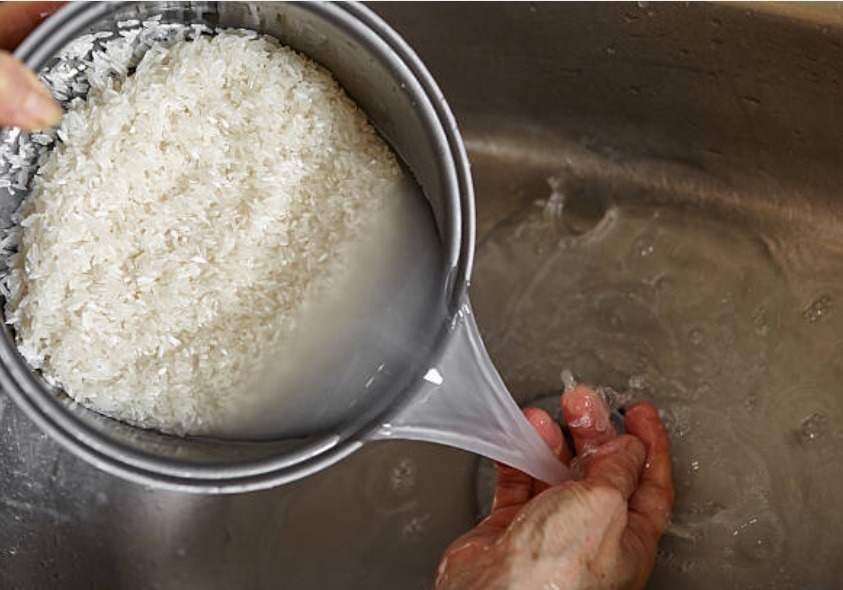
Rice water for hair: benefits and how to use it
How to make Rice Water for Hair! What does rice water do for your hair? Women in China, Japan, and Southeast Asia have used rice water as a hair treatment for centuries. But does rice water have any scientifically proven beauty benefits?
Rice water is the starchy water left over after rice is cooked or left to soak. It is thought to make the hair smooth and shiny, as well as help it grow faster.
This article looks at the beauty benefits of rice water hair treatments and whether scientific research backs up the purported results.
Using rice water for hair
Rice water may increase the shine of hair, make it stronger, and detangle it.
Rice grains contain 75–80-percent starch.
Also Rice water is the starchy water that remains after soaking or cooking rice.
Rice water is thought to contain many of the vitamins and minerals contained in rice. These include:
- Amino acids
- B vitamins
- Vitamin E
- Minerals
- Antioxidants
History
According to researchers, women in the Heian period (794 to 1185 CE) in Japan had floor-length hair they kept healthy by bathing it in rice water.
A modern-day equivalent of this story can be found in China. The Yao women, who live in a village called Huangluo in China, are famed for having hair that averages 6 feet long.
In addition to its incredible length, the Yao women’s hair is said to keep its color for longer, as they do not begin to get gray hair until they reach their 80s.
The Yao women credit the length and color of their hair to the fact they bathe it in rice water.
In recent years, beauty advice websites and product developers have caught on to this tradition. Now, the rice water trend is spreading.
Benefits
Advocates of using rice water for hair believe it:
- Detangles the hair
- Makes hair smoother
- Increases shine
- Makes hair stronger
- Helps hair grow long
What the research says
As the popularity of using rice water for hair increases, there is growing anecdotal evidence about its benefits. But are the claims scientifically proven?
At first glance, a 2010 paper suggests they may be. The authors note that rice water may reduce surface friction and increase hair elasticity. However, the study relies on historical examples to draw unsupported conclusions.
Elsewhere, a research facility in Japan has developed an imaging technique that visualizes the strengthening effect of inositol on hair. Inositol is contained in rice water.
It is important to note that this research is published directly by a facility that may have commercial interests.
To date, the benefits of rice water for hair remain unproven. More research is needed to support anecdotal evidence about the benefits of rice water for hair.
How to make rice water
There are several different ways to make rice water, including
Soaking
Rinsing rice thoroughly is part of the soaking process.
Soaking is the quickest way to make rice water.
To use this method:
- Take ½ cup of uncooked rice
- Rinse thoroughly.
- Place rice in a bowl with 2–3 cups of water
- Leave to soak for 30 minutes
- Strain the rice water into a clean bowl
Fermented vs. plain rice water
Some rice water advocates claim fermented rice water has more benefits than plain rice water.
According to a 2012 study, fermented substances have a higher amount of antioxidants. Antioxidants may combat hair and skin cell damage, which is why they are typical ingredients in beauty products.
To ferment rice water, follow steps 1–4 of the soaking method. Before straining, leave the rice water to stand at room temperature for up to 2 days, allowing it to ferment. Strain the rice water into a clean bowl before use.
Boiling
Another way to make rice water is by boiling the rice.
Cover ½ cup of rice with double the water typically used for cooking. Cook the rice in boiling water and strain the rice water into a clean bowl before use.
How to use rice water
Rice water can replace a commercial conditioner. To do this, a person should:
- Wash hair with shampoo
- Rinse thoroughly with water from the tap
- Pour rice water onto their hair
- Massage the rice water into the hair and scalp
- Leave on for up to 20 minutes
- Rinse hair thoroughly using warm water from the tap
Skin benefits
In addition to its potential beauty benefits for the hair, rice water may also benefit the skin.
A 2002 study found that the starch in rice water helped damaged skin heal for people with dermatitis.
Conclusion
Rinsing hair in rice water is a traditional beauty treatment popular in many regions in Asia.
Having gained attention online, this alternative beauty remedy is now popular across the world.
Many people find rice water to be a beneficial hair treatment. Historical examples and anecdotal evidence suggest rice water may improve the strength, texture, and growth of hair.
Most scientific evidence about the treatment is inconclusive, so more research is needed to prove the benefits of using rice water.
While its benefits for hair remain unproven, using a rice water hair rinse is safe to try at home and may also be used on the skin. It has been found to promote skin health in people with dermatitis.
